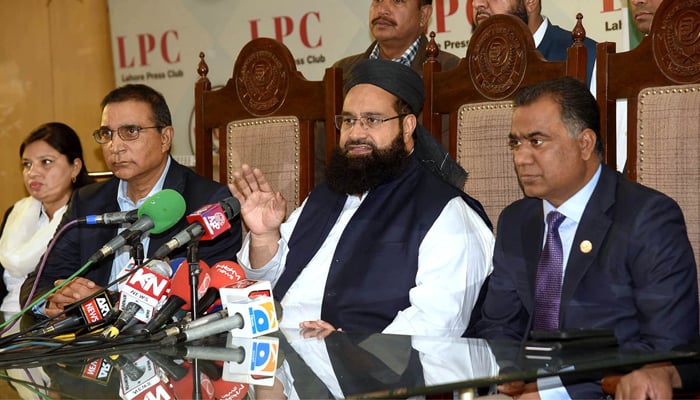Ashrafi attributes economic progress to efforts of Arab, other Islamic countries
ISLAMABAD: Prime Minister’s Special Representative on Religious Harmony and Pakistani Diaspora in the Middle East and Islamic Countries Hafiz Tahir Mahmood Ashrafi on Tuesday attributed improvement in economic situation in Pakistan to the collaborative efforts of Arab and Islamic nations, along with the positive impact of the Special Investment Facilitation Council (SIFC).
“The encouraging developments were emerging from Saudi Arabia, Kuwait, Qatar, and other amicable nations, following the substantial financial agreements with the UAE,” he said while talking to the media on Tuesday.
Ashrafi acknowledged that foreign investment in Pakistan was made feasible through the trust of friendly countries and the dedicated efforts of Chief of Army Staff General Syed Asim Munir.
He emphasised that Pakistan could not afford to repeat past mistakes and animosities, stating, “Islamic brother countries desire a resilient Pakistan.”
He highlighted that the SIFC played a pivotal role in attracting investments to Pakistan, with significant participation from important businessmen and groups of friendly nations.
He assured that overseas Pakistanis could now invest confidently, underscoring the government’s responsibility to facilitate and support them.
In response to a question, Ashrafi affirmed that Pakistan, as a core member of the Organisation of Islamic Cooperation (OIC), maintained an unequivocal stance on the Palestine issue.
He emphasised that any solution acceptable to Palestine would find acceptance in Pakistan.
He praised the current leadership of the OIC under Saudi Arabia. He also acknowledged the contributions of Turkiye, Iran, and Qatar, highlighting that the collective pressure from OIC members played a crucial role of Europe, America, and Britain in influencing Israel to cease hostilities.
At this time, he asserted that all Islamic nations were unanimous on extension of the ceasefire and advocated for the establishment of a sovereign and autonomous Palestinian state, designating Al-Quds as its capital.
-
 Camila Mendes Reveals How She Prepared For Her Role In 'Idiotka'
Camila Mendes Reveals How She Prepared For Her Role In 'Idiotka' -
 China Confirms Visa-free Travel For UK, Canada Nationals
China Confirms Visa-free Travel For UK, Canada Nationals -
 Inside Sarah Ferguson, Andrew Windsor's Emotional Collapse After Epstein Fallout
Inside Sarah Ferguson, Andrew Windsor's Emotional Collapse After Epstein Fallout -
 Bad Bunny's Star Power Explodes Tourism Searches For His Hometown
Bad Bunny's Star Power Explodes Tourism Searches For His Hometown -
 Jennifer Aniston Gives Peek Into Love Life With Cryptic Snap Of Jim Curtis
Jennifer Aniston Gives Peek Into Love Life With Cryptic Snap Of Jim Curtis -
 Prince Harry Turns Diana Into Content: ‘It Would Have Appalled Her To Be Repackaged For Profit’
Prince Harry Turns Diana Into Content: ‘It Would Have Appalled Her To Be Repackaged For Profit’ -
 Prince William's Love For His Three Children Revealed During Family Crisis
Prince William's Love For His Three Children Revealed During Family Crisis -
 Murder Suspect Kills Himself After Woman Found Dead In Missouri
Murder Suspect Kills Himself After Woman Found Dead In Missouri -
 Sarah Ferguson's Plea To Jeffrey Epstein Exposed In New Files
Sarah Ferguson's Plea To Jeffrey Epstein Exposed In New Files -
 Prince William Prepares For War Against Prince Harry: Nothing Is Off The Table Not Legal Ways Or His Influence
Prince William Prepares For War Against Prince Harry: Nothing Is Off The Table Not Legal Ways Or His Influence -
 'How To Get Away With Murder' Star Karla Souza Is Still Friends With THIS Costar
'How To Get Away With Murder' Star Karla Souza Is Still Friends With THIS Costar -
 Pal Reveals Prince William’s ‘disorienting’ Turmoil Over Kate’s Cancer: ‘You Saw In His Eyes & The Way He Held Himself’
Pal Reveals Prince William’s ‘disorienting’ Turmoil Over Kate’s Cancer: ‘You Saw In His Eyes & The Way He Held Himself’ -
 Poll Reveals Majority Of Americans' Views On Bad Bunny
Poll Reveals Majority Of Americans' Views On Bad Bunny -
 Wiz Khalifa Thanks Aimee Aguilar For 'supporting Though Worst' After Dad's Death
Wiz Khalifa Thanks Aimee Aguilar For 'supporting Though Worst' After Dad's Death -
 Man Convicted After DNA Links Him To 20-year-old Rape Case
Man Convicted After DNA Links Him To 20-year-old Rape Case -
 Royal Expert Shares Update In Kate Middleton's Relationship With Princess Eugenie, Beatrice
Royal Expert Shares Update In Kate Middleton's Relationship With Princess Eugenie, Beatrice




